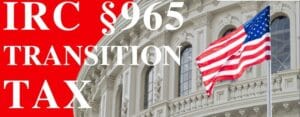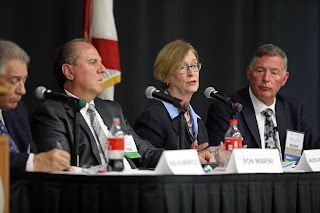 According to Law360, The U.S. Supreme Court agreed this month to review a tax-related case on attorney-client privilege, and practitioners hope the court will use the occasion to take a broad approach toward privilege that acknowledges the importance of tax advice.
According to Law360, The U.S. Supreme Court agreed this month to review a tax-related case on attorney-client privilege, and practitioners hope the court will use the occasion to take a broad approach toward privilege that acknowledges the importance of tax advice.
A U.S. Supreme Court case on whether a law firm has to comply with grand jury subpoenas for tax-related client communications will likely have wide-reaching implications for how lawyers manage the combination of legal and nonlegal advice.
The Case, Known As In Re: Grand Jury, Will Likely Have Wide-Reaching Implications For How Lawyers Manage Client Communications Containing Both Legal And Nonlegal Advice.
In the case, an unnamed law firm is challenging a Ninth Circuit decision finding it had to comply with grand jury subpoenas for communications and other materials related to a client's expatriation and tax return preparation. The firm's petition to the Supreme Court, filed in May, argued that the justices should clarify the law concerning when attorney-client privilege protects such mixed-use communications.
The controversy partly stems from uneven treatment in the federal courts on what is considered private tax information. Some have held that attorney-client privilege doesn't apply to communications that deal with a client's tax return preparation, while it does for tax controversy and tax planning issues.
Complicating matters is a split among the federal circuit courts on how far attorney-client privilege can protect communications that serve multiple purposes. Many business and legal groups prefer the more expansive privilege test set by the D.C. Circuit in 2014. In that case, known as In re: Kellogg Brown & Root Inc , the appeals court held in an opinion authored by then-U.S. Circuit Judge Brett Kavanaugh that multipurpose communications should be protected if one of the reasons for them was to obtain or provide legal advice.
Then, last year, the Ninth Circuit roiled tax attorneys with its decision in the In re: Grand Jury case, which said the primary purpose of the communications must be legal advice in order for them to remain confidential.
 In A Footnote, The Court Said "Normal Tax Advice, Even Coming From Lawyers, Is Generally Not Privileged, And Courts Should Be Careful To Not Accidentally Create An Accountant's Privilege Where None Is Supposed To Exist."
In A Footnote, The Court Said "Normal Tax Advice, Even Coming From Lawyers, Is Generally Not Privileged, And Courts Should Be Careful To Not Accidentally Create An Accountant's Privilege Where None Is Supposed To Exist."
Although the Ninth Circuit amended the footnote to change "tax advice" to "tax preparation assistance," the court's sentiment was troubling, said John Colvin of Seattle-based Colvin & Hallett.
The decision portrayed the tax legal practice as merely tax preparation service and "not real attorney work," he said.
But nothing is further from the truth, Colvin said, because people specifically seek advice from tax attorneys to help them interpret complicated tax laws, including U.S. Department of Treasury regulations and court opinions, that apply to their own circumstances.
When Clients Come To Tax Attorneys, "We Know That Some Or All Of The Legal Advice Is Going To End Up In A Tax Return," He Said.
The Supreme Court agreed to examine the case at the request of the unnamed law firm that has been fighting to keep confidential tax expatriation documents, in the name of attorney-client privilege and work-product doctrine, from disclosure to a grand jury investigating a client.
The firm wants the justices to review the Ninth Circuit decision, which ordered the disclosure of client documents that the firm described as "dual purpose communications" with "tax advice."
The Ninth Circuit Said The Documents Were Not Privileged Because Their "Primary Purpose" Was Seeking
Tax Advice Rather Than Legal Advice.
The Washington Legal Foundation, a pro-business public interest law firm and policy center, also recognized the challenges of identifying what constitutes a tax issue in a May amicus brief endorsing Supreme Court review of the case. The group said the Ninth Circuit's narrow view of attorney-client privilege creates "tax-specific rules that conflict with rules that govern other areas of law."
That's why the Supreme Court in the In re: Grand Jury case should create uniform federal attorney-client standards in tax communications, the brief said, arguing that doing so would help compliance and enforcement.
Have an IRS Tax Problem?
Contact the Tax Lawyers at
Marini & Associates, P.A.
for a FREE Tax HELP Contact us at:
www.TaxAid.com or www.OVDPLaw.com
or Toll Free at 888 8TAXAID (888-882-9243)





 Although not listed separately, human capital is also a significant concern, and it affects the IRS' ability to address the above challenges."
Although not listed separately, human capital is also a significant concern, and it affects the IRS' ability to address the above challenges."


